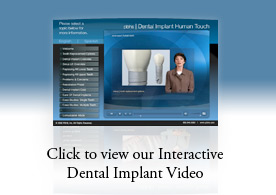Procedures
Dental Implants
Dental Implant Presentation
To provide you with a better understanding of dental implants, we have provided the following multimedia presentation. Many common questions pertaining to dental implants are discussed.
click here for low-res version
Having trouble? Please make sure you have version 9 of the Flash browser plugin in order to correctly view this presentation. This software is available as a free download.
Dental implants are changing the way people live. They are designed to provide a foundation for replacement teeth that look, feel, and function like natural teeth. The person who has lost teeth regains the ability to eat virtually anything, knowing that teeth appear natural and that facial contours will be preserved. Patients with dental implants can smile with confidence.
What Are Dental Implants?
The implants themselves are tiny titanium posts that are surgically placed into the jawbone where teeth are missing. These metal anchors act as tooth root substitutes. The bone bonds with the titanium, creating a strong foundation for artificial teeth. Small posts that protrude through the gums are then attached to the implant. These posts provide stable anchors for artificial replacement teeth.
The Surgical Procedure
For most patients, the placement of dental implants involves two surgical procedures. First, implants are placed within your jawbone. For the first three to six months following surgery, the implants are beneath the surface of the gums gradually bonding with the jawbone. You should be able to wear temporary dentures and eat a soft diet during this time. At the same time, your dentist will be fabricating new replacement teeth.
After the implant has bonded to the jawbone, the second phase begins. Dr. Folck will uncover the implants and attach small posts that protrude through the gums and will act as anchors for the artificial teeth. When the artificial teeth are placed, these posts will not be seen. The entire procedure usually takes six to eight months. Most patients experience minimal disruption in their daily life.
Surgical Advances
Using the most recent advances in dental implant technology, Dr. Folck is able to place single stage implants. These implants do not require a second procedure to uncover them, but do require a minimum of six weeks of healing time before artificial teeth are placed. There are even situations where the implants can be placed at the same time as a tooth extraction – further minimizing the number of surgical procedures.
Dental Implant placement is a team effort between an oral and maxillofacial surgeon and a restorative dentist. While Dr. Folck performs the actual implant surgery, initial tooth extractions, and bone grafting if necessary, the restorative dentist (your dentist) fits and makes the permanent teeth/prosthesis. Your dentist will also make any temporary teeth/prosthesis needed during the implant process.
What Types Of Prostheses Are Available?
A single prosthesis (crown) is used to replace one missing tooth – each prosthetic tooth attaches to its own implant. A partial prosthesis (fixed bridge) can replace two or more teeth and may require only two or three implants. A complete dental prosthesis (fixed bridge) replaces all the teeth in your upper or lower jaw. The number of implants varies depending upon which type of complete prosthesis (removable or fixed) is recommended. A removable prosthesis (over denture) attaches to a bar or ball in socket attachments, whereas a fixed prosthesis is permanent and removable only by the dentist.
Dr. Folck performs in-office implant surgery in a hospital-style operating suite, thus optimizing the level of sterility. Inpatient hospital implant surgery is for patients who have special medical or anesthetic needs or for those who need extensive bone grafting from the jaw, hip or tibia.
Do Implants Need Special Care?
Once the implants are in place, they will serve you well for many years if you take care of them and keep your mouth healthy. This means taking the time for good oral hygiene (brushing and flossing) and keeping regular appointments with your dentist.
Cost of Dental Implants
How much does a dental implant cost?
The short answer is “It depends.”
What does it depend on?
- the location of the implant in the jaw
- whether the bone has been resorbed and requires bone grafting
- any other health conditions that might cause complications
- the cost of the actual implant and crown
- the doctor’s experience and expertise
Placing a dental implant requires a number of steps, generally involving several professionals.
- Examination
- Extraction
- Bone graft or site preservation
- Placing the Dental Implant – the titanium “tooth root”
- Placing the Crown – the porcelain “tooth”
- Office visits, x-rays, pre- and post-surgical care
Please call our office at (757) 340-9146 to set up an appointment where we can review the specifics of your case, and the costs of your particular treatment.
Continuing Cost of Bridges and Dentures
While Bridges and Dentures are less expensive at the outset, you should consider that both options have sometimes considerable continuing expenses. Bridges, by their structure, cut down the neighboring abutment teeth - which can lead to weakness and repeated treatments. Dentures cannot preserve the jaw bone the way Dental Implants can, so the jaw shrinks as the bone is resorbed, leading to ill-fitting Dentures and repeated rounds of re-fitting and re-placing. Over a lifetime, Dental Implants can be the cost-effective as well as esthetic choice.
Home | Patient Information | Procedures | Meet Dr. Folck | Surgical Instructions | Online Forms | Referring Doctors | Contact Us | Site Map
Mid Atlantic Implant & Oral Surgery Center | Michael P. Folck II, D.D.S., M.D.
272 Bendix Rd. Suite 280 Virginia Beach, VA 23452 .::. Phone: (757) 340-9146 .::. Fax: (757) 340-2647
Oral Surgeon Michael P. Folck II specializes in oral and maxillofacial surgery which includes: wisdom teeth removal, dental implants, bone grafting, impacted Canines,orthognathic (jaw) surgery, sleep apnea, facial trauma, tmj disorders, oral pathology, platelet rich plasma.
Oral Surgery Website Designby PBHS 2011©
